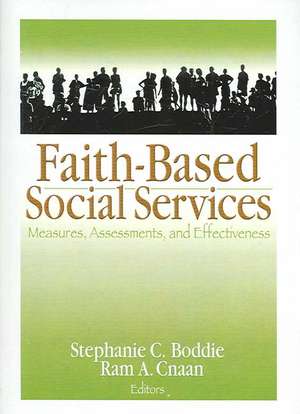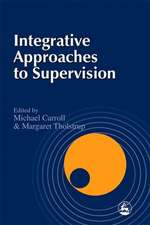Faith-Based Social Services: Measures, Assessments, and Effectiveness
Editat de Stephanie C. Boddie, Ram A. Cnaanen Limba Engleză Paperback – 20 feb 2007
The Charitable Choice provision and the Bush Administration’s National Faith-Based Initiative have broadened the scope of social services delivered through faith-based organizations. There are expectations that these faith-based social service providers will be more effective—but how should that effectiveness be measured? Faith-Based Social Services: Measures, Assessments, and Effectiveness explains the nature and quality of religion-based social service delivery while serving as a point of reference for future research and work. This unique source tackles the important, complex issue of measuring the effectiveness of faith-based social services in comparison to secular services while providing analysis of the latest available studies.
Faith-Based Social Services: Measures, Assessments, and Effectiveness provides a conceptual analysis of FBOs (faith-based organizations) that reflects the need to gather detailed studies to assess social service effectiveness while reviewing the crucial issues challenging public policy. The latest empirical research is detailed, including the problems found when comparing secular and faith-based social service providers, their organizational structures, and the types of services offered. Analysis is included of the data from a three-state evaluation of welfare to work programs, a study of four types of faith-based services found in four cities, and an assessment of a church-based program for teenage drop-outs.
Topics in Faith-Based Social Services: Measures, Assessments, and Effectiveness include:
- discussion on how social science research shunned faith-based services and how this neglect affected effectiveness
- problems inherent in efficacy assessment
- making funding priorities decisions
- the causes of outcome differences
- a model of evaluation based on randomized controlled clinical trials
- using measurement practices currently used by the nonprofit sector
- comparative case studies in transitional housing, parent education, and residential substance abuse treatment programs
- latest analysis of research involving faith-based organizations and the provided services’ efficacy
- much more!
| Toate formatele și edițiile | Preț | Express |
|---|---|---|
| Paperback (1) | 256.23 lei 6-8 săpt. | |
| Taylor & Francis – 20 feb 2007 | 256.23 lei 6-8 săpt. | |
| Hardback (1) | 741.53 lei 6-8 săpt. | |
| Taylor & Francis – 2 mar 2007 | 741.53 lei 6-8 săpt. |
Preț: 256.23 lei
Preț vechi: 494.56 lei
-48% Nou
Puncte Express: 384
Preț estimativ în valută:
49.05€ • 53.29$ • 41.22£
49.05€ • 53.29$ • 41.22£
Carte tipărită la comandă
Livrare economică 21 aprilie-05 mai
Preluare comenzi: 021 569.72.76
Specificații
ISBN-13: 9780789035240
ISBN-10: 0789035243
Pagini: 312
Dimensiuni: 148 x 210 x 25 mm
Greutate: 0.58 kg
Ediția:1
Editura: Taylor & Francis
Colecția Routledge
Locul publicării:Oxford, United Kingdom
ISBN-10: 0789035243
Pagini: 312
Dimensiuni: 148 x 210 x 25 mm
Greutate: 0.58 kg
Ediția:1
Editura: Taylor & Francis
Colecția Routledge
Locul publicării:Oxford, United Kingdom
Cuprins
- Section I: Conceptual Analysis
- Introduction (Ram A. Cnaan and Stephanie C. Boddie)
- Chapter 1. Setting the Context: Assessing the Effectiveness of Faith-Based Social Services (Ram A. Cnaan and Stephanie C. Boddie)
- Chapter 2. Finding Congregations: Developing Conceptual Clarity in the Study of Faith-Based Social Services (Charlene C. McGrew and Ram A. Cnaan)
- Chapter 3. Detecting and Decomposing the “Faith Factor” in Social-Service Provision and Absorption (George M. von Furstenberg)
- Chapter 4. Faith-Based Programs and the Role of Empirical Research (Bruce A. Thyer)
- Chapter 5. Social Service Research and Religion: Thoughts About How to Measure Intervention-Based Impact (David A. Zanis and Ram A. Cnaan)
- Chapter 6. Testing Faith: Improving the Evidence Base on Faith-Based Human Services (Robert L. Fischer and Judson D. Stelter)
- Section II: Emerging Empirical Findings
- Introduction (Stephanie C. Boddie and Ram A. Cnaan)
- Chapter 7. How Do They Fit? Assessing the Role of Faith-Based Organizations in Social Service Provision (Elizabeth A. Graddy)
- Chapter 8. Investigating the Implementation of Charitable Choice (Wolfgang Bielefeld)
- Chapter 9. The Effectiveness of Faith-Based Welfare-to-Work Programs: A Story of Specialization (Stephen V. Monsma)
- Chapter 10. A Faith-Based Alternative Youth Education Program: Evaluating a Participatory Research Approach (Jill Witmer Sinha)
- Chapter 11. Evaluating the Effectiveness of Faith-Based Welfare Agencies: Methodological Challenges and Possibilities (Susan E. Grettenberger, John P. Bartkowski, and Steven R. Smith)
- Chapter 12. Assessing the Effectiveness of Faith-Based Programs: A Local Network Perspective (David Campbell and Eric Glunt)
- Chapter 13. Belief Systems in Faith-Based Human Service Program (F. Ellen Netting, Mary Katherine O’Connor, and Gaynor Yancey)
- Concluding Remarks: Common Findings and Challenges (Stephanie C. Boddie and Ram A. Cnaan)
- Index
- Reference Notes Included
Notă biografică
Stephanie C. Boddie, Ram A. Cnaan
Descriere
The Charitable Choice provision and the Bush Administration's National Faith-Based Initiative have broadened the scope of social services delivered through faith-based organizations. There are expectations that these faith-based social service providers will be more effective - but how should that effectiveness be measured? Faith-Based Social Services: Measures, Assessments, and Effectiveness explains the nature and quality of religion-based social service delivery while serving as a point of reference for future research and work. This unique source tackles the important, complex issue of measuring the effectiveness of faith-based social services in comparison to secular services while providing analysis of the latest available studies.




















